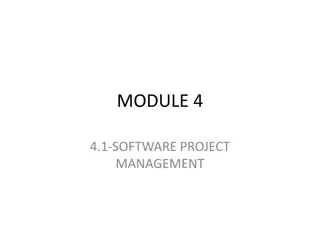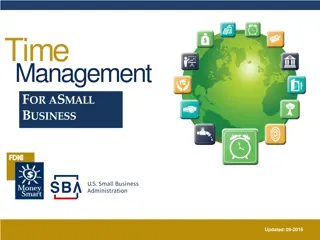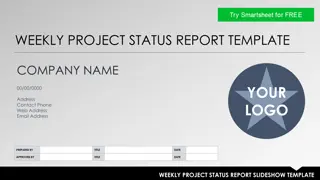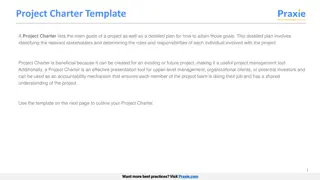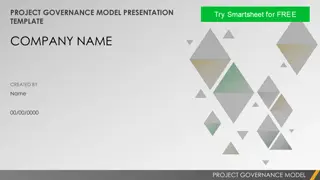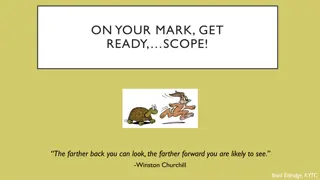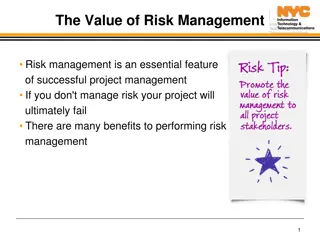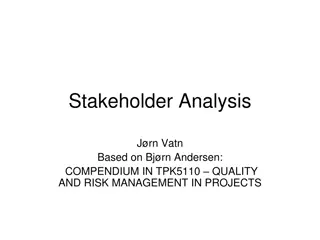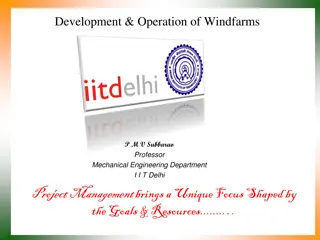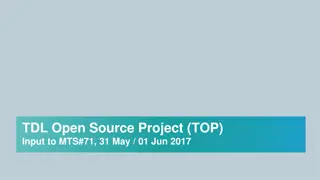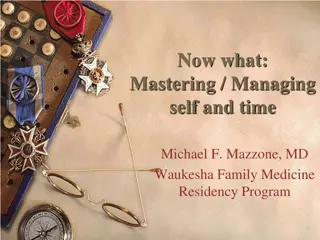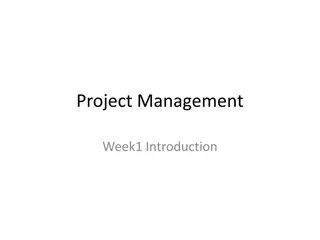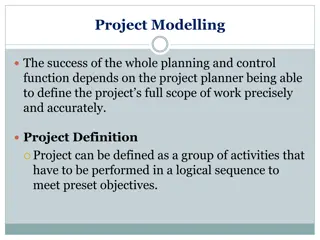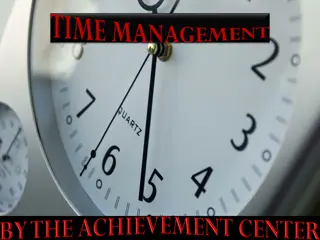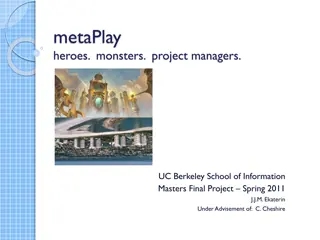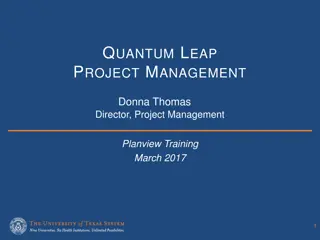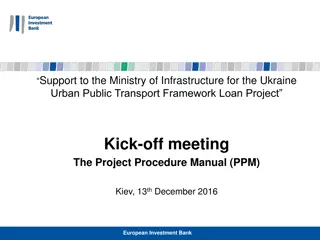Effective Project and Time Management Strategies for Success
Workplace considerations, work-life balance, and time management tips are crucial for achieving success. Striking a balance between work and personal life is challenging but essential. Understanding the phases of a project and implementing effective time management techniques can lead to increased productivity and reduced stress. Explore the concepts of work-life integration and blend to find what works best for you. Recognize the history of work-life balance and the importance of disconnecting to prevent burnout.
Download Presentation

Please find below an Image/Link to download the presentation.
The content on the website is provided AS IS for your information and personal use only. It may not be sold, licensed, or shared on other websites without obtaining consent from the author. Download presentation by click this link. If you encounter any issues during the download, it is possible that the publisher has removed the file from their server.
E N D
Presentation Transcript
Project & Time Management Tips for Success Presented by: Chris Bitakis, CPA, CGFM, CGMA Principal, Audit and Consulting Emily Wilson, CPA, CFE Manager, Audit and Consulting April 7, 2021 The information provided herein is for informational purposes only and should not be construed as financial, investment, tax, accounting or legal advice.
Todays Topics Workplace Considerations The 5 Phases of a Project Time Management Tips and Tricks for Project and Time Management 2
Work Place Considerations Fantasy - You envision that perfect 50/50 balance point, where you magically finish everything you need to do for work and still have time left over for going to hot yoga, making homemade bone broth, getting 8 hours of sleep, and everything else Instagram tells you to do to be a well-rounded human. Reality- You re working on that report but you have to stop work early because you haven t been to the dentist in an embarrassingly long time. Or you re trying to meal prep at home when an important email comes in, and next thing you know you ve burned everything and you re stuck eating instant ramen for lunch tomorrow. 3
Work Place Considerations Stats An American Sociological Review study found that 7 out of 10 US workers struggle with the work/life challenges Meetings and presentations, errands and appointments, conference calls and research, laundry and takeout, pets and sippy cups they re all threads in the fabric of this little thing called life 4
Polling Question #1 How would you describe your workplace mindset? a.) Work Life Balance b.) Work Life Integration c.) Work Life Blend 5
Work Place Considerations Work Life Balance Work Life Integration Work Life Blend 6
Work Place Considerations Work-Life Balance Brief History Roots trace back to the First Industrial Revolution Majority of U.S. workers working 100 hours a week Fair Labor Standards Act The actual term work-life balance 1980 s Defining Work-Life Balance Today Effective time management Burnout prevention and stress management Disconnect between HR and employees 7
Work Place Considerations Work-Life Integration Brief History By-product of changes in society Credited to Millennials and Generation Z Defining Work-Life Integration Today Not about managing conflicting demands Making constant accommodations for the rapid pace of change 8
Work Place Considerations Work-Life Blend Brief History Forbes published this concept in 2012 Finding a better way to fit it all together Defining Work-Life Blend Today Doesn t mean everything is happening at the same time Requires some boundaries but can t be rigid - Allow for overlap (miss a family dinner) but can t turn into routine 10
Work Place Considerations Post Pandemic Harvard Business School The need to prioritize face time at the office More honest conversations with employees Weigh the risks of loneliness Consider flexible hybrid approach Reject virtual work at your Company s peril Make work inspiring at the office or not Be fair when deciding who works remotely 11
What is a project? What is a project? 12
What is a project? A temporary endeavor undertaken to create a unique product, service or result. A project is temporary in that it has a defined beginning and end in time, and therefore defined scope and resources. PMBOK, 5th Edition, Chapter 1, Section 1.2, p3 13
What is a Project Management? Project Management The application of knowledge, skills, tools, and techniques to meet project requirements. The discipline of initiating, planning, executing, controlling, and closing the work of a team to achieve specific goals and meet specific success criteria at the specified time. 14
Project Management: Why is this Important? Vision Creating an inspiring vision of the future Motivating and inspiring people to engage in that vision Motivate Manage Managing delivery of the vision Coaching and building a team, so that it is more effective at achieving the vision Coach Achieve Uphold the goals of the project to achieve results 15
Examples of Projects Procuring a contract Implementing new policies and procedures Software upgrade Preparing a CAFR Preparing for an audit Going to Disney World Your day 16
5 Phases of Project Management INITIATING INITIATING PLANNING PLANNING Goal setting Outline objectives of the project Communicate objectives and goals to team Effective planning is vital to success Ongoing process and never ends during life of project Needs of project formally accepted Project ideas carefully examined Project manager appointed PM selects team members based on experience and skills. Research whether project is feasible CLOSING CLOSING EXECUTING EXECUTING MONITORING & MONITORING & CONTROLLING CONTROLLING Measure progression/ performance Ensure alignment w/project plan Observe, evaluate, document & report on progress/limitations In this phase, we react/adjust to issues, inefficiencies, ineffectiveness that arise Project closing process often overlooked Consists of processes performed to complete project Once completed, post mortem meeting held to evaluate what went well and identify project failures Project start to take shape Project plan put into action Tasks occur in executing project Team adheres to mapped out plan Coordination amount team members and resources Project deliverable developed and completed 17
Polling Question #2 You are hosting a Family Barbeque (with social distancing and masks): Which of the following tasks would fall into the planning phase of project management? a.) Create a grocery List b.) Discussion on what to make next year c.) Project manager Executive Chef appointed d.) Executing tasks/timeline 18
5 Phases Example: Family BBQ 2 1 PLANNING PLANNING INITIATING INITIATING You agree to host a family barbeque Project manager aka Executive Chef appointed Who is going help you? What dishes are you going to make Research recipes, cooking times, etc. Goal setting: Don t burn the burgers How many people attending? Assign tasks to other family members Have a backup plan? Create a grocery List Timeline MONITORING & MONITORING & CONTROLLING CONTROLLING Checking in on timeline: Will dinner be ready by 5pm? Burgers burned? Dinner is served CLOSING CLOSING 4 EXECUTING EXECUTING 5 3 What did everyone like? What could you do without next time? Close out meeting: next barbeque we are getting takeout/cooking something different Grocery shopping Food prep Cooking You execute tasks/timeline 19
Time Management What is time management and why is it important? 20
Polling Question #3 Do you feel like you manage your time well? a.) Yes b.) No c.) Sort of but I could do better 21
Time Management Basic skill as a project manager Decrease the time spent on unproductive activities Develop more accurate estimates for turnaround time on projects Improve execution of project plan 22
Time Management - The 80/20 Principle Pareto Principle 80/20 Rule 23
Time Management - 80/20 Principle 20% of the sales reps generate 80% of total sales. 20% of customers account for 80% of total profits. 20% of the most reported software bugs cause 80% of software crashes. 20% of patients account for 80% of healthcare spending (and 5% of patients account for a full 50% of all expenditures!) On a more personal note, you might be able to relate to my unintentional 80/20 habits 24
Polling Question #4 What is your preferred method for time management? a.) To-Do Lists b.) Microsoft Planner c.) Outlook Calendar d.) All of the above e.) I just wing it 25
Time Management - 7 Habits of Highly Effective People Habit #1 Be proactive Habit #2 Begin with the end in mind Habit #3 Put first things first Habit #4 Think win-win Habit #5 Seek first to understand, then to be understood Habit #6 Synergize Habit #7 Sharpen the saw; growth 26
Time Management Urgent Not Urgent Quadrant 2 Quadrant 1 Important Preparation Prevention Values Clarification Planning Relationship Building Crisis Pressing problems Deadline driven projects Meetings Quadrant3 Quadrant 4 Not Important Busywork Some phone calls Irrelevant mail Pleasant activities Social media/web surfing Interruptions Some phone calls, mail, reports Pressing matters Some meetings 27
Polling Question #5 Which quadrant do you identify most with on a daily basis? a.) Quadrant 1 b.) Quadrant 2 c.) Quadrant 3 d.) Quadrant 4 28
Time Management - Managing the Quadrants Where should you be spending your time? The average person spends 25% in category 1, 15% in category 2, 57% in category 3 and 3% in category 4. The average goal would be to spend approximately 20% in category 1, 64% in category 2, 15% in category 3 and 1% or less in category 4. 29
Time Management Activity Take a few minutes and think of the busiest day you ve had in the last week. From 8am to 8pm list activities you engaged in each hour Examples: work, CPE, parenting, hobbies, watching Netflix, browsing social media, cooking dinner, etc. Next to each item, put the quadrant # each tasks falls into 30
Mine Urgent Not Urgent Quadrant 2 Quadrant 1 Important Preparing for this presentation Planning for next project Exercise Meal Planning Relationship Building Replacing hot water heater Children crying Exit presentation (24 hours notice) Proposals/fee quotes Quadrant3 Quadrant 4 Not Important Busywork Some phone calls Irrelevant mail Pleasant activities Social media/web surfing March Madness Family interruptions Some meetings Phone notifications 31
Techniques and Tips for Time Management So how do I change my time management habits? Remember, the key is not to prioritize your schedule, but to schedule your priorities Hold yourself accountable to others Plan ahead Protect your time and recognize when it may be okay to say no to something in the immediate future but shift it to a later date Align the level of energy with the level of impact 32
Techniques and Tips for Project Management Plans are worthless, but Planning is Everything Dwight D. Eisenhower Leadership Communicate, Communicate, Communicate Creating budgets/schedule Avoid multiple touches Express Gratitude Debrief/Reflect 33
Techniques and Tips for a Better Workday Focus on high reward tasks Don t over plan Learn to manage email Learn shortcuts Question what is not clear Don t stress Get organized 34
Questions 35





